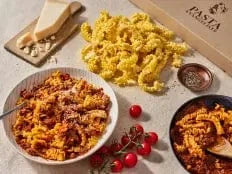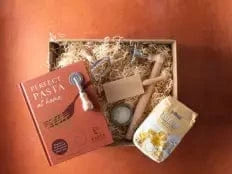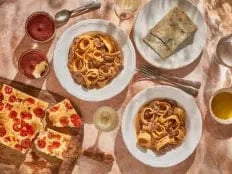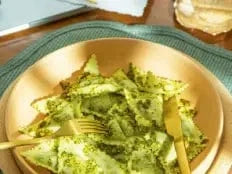Wild Boar Ragù with Pici: A Taste of Tuscany
: invalid url input)
Known as the unofficial mascot of Tuscany, wild boar, or “cinghiale” as it is known in the vernacular, has the dubious honour of being both a local emblem and a local delicacy. Eaten and revered in equal measure, the swine are cherished throughout the region, with the Tuscan capital of Florence boasting its own statue commemorating the beast. Known locally as "Il Porcellino", it’s said to be good luck to touch the nose of the bronze boar!
The animals forage in local woodlands – mainly concentrated around the coastal area of Maremma – occasionally causing mischief in vineyards and even gardens, but Tuscans adore the rich, gamey flavour they lend to local dishes.
Our sumptuous ragu sees the wild boar slowly simmered in a traditional bath of red wine, juniper berries and tomato – a dish known locally as "cinghiale in umido" – until rich and intensely meaty. We serve this luxuriant ragu with delightfully chewy and moreish strands of pici, in adherence with local tradition. Similar to spaghetti in shape, pici lend a unique textural element to this dish, their thick strands a perfect pairing for the robust ragu. Pici originate in Siena, which, alongside Florence, is renowned as one of Tuscany's jewels.
Pici al Cinghiale: Wild Boar Ragù Recipe
Serves 6
Prep time: 6hrs+
Cook time: 4hrs 30mins
Calories per serving: 627 kcal
Ingredients:
- 1 kilo wild boar meat (preferably shoulder meat), cubed.
- 750ml good quality red wine
- 500ml chicken stock
- 1 onion, finely chopped
- 1 stick celery, finely chopped
- 1 carrot, finely chopped
- 1 clove garlic, crushed
- 2 tbsp tomato puree
- 1 tbsp extra virgin olive oil
- 3 bay leaves
- 3 sprigs fresh thyme
- 10g juniper berries
- Salt and pepper to taste
- 600g fresh Pici - for ingredients, see our guide to preparing fresh pasta bianca dough here
Method:
- Roughly dice the wild boar meat, and place in a large mixing bowl, before covering with red wine. Cover and allow to marinate for at least six hours (though overnight is best).
- Once the meat is ready, add a glug of olive oil to a dutch oven over medium heat. Once the pan is hot, add the diced onion, carrot and celery, and sweat the mixture until soft and translucent. Add the garlic, and continue to fry until fragrant.
- Separate the meat from the marinade, and add to the pot. Brown the meat, allowing it to fry for around five minutes.
- Add the tomato puree, and combine, before deglazing the pan with around half of the wine used for marinating. Once the alcohol has cooked off, add your chicken stock to the pan, as well as your aromatics - the bay leaves, thyme and juniper berries.
- Stir until well-mixed, before covering with a lid. Reduce the heat, and allow to simmer and thicken for around 4 hours. Stir occasionally to avoid any sticking.
- In the meantime, prepare your pasta dough, following our incredibly simple pasta bianca recipe.
- Once the dough is rested, place it on a very lightly floured surface, and form into a rough rectangle - the key here is to result in a fairly evenly shaped block of pasta, in which to take your strands.
- Using a knife, cut a long strand of pasta from your dough. With both hands, begin to roll your dough into a long worm-like shape. Don’t worry if your strands are a little ‘rustic’ in appearance, they’ll still be delicious! Feel free to cut your pici into smaller pieces, making it easier to manage.
- Place your finished pici strand on a floured tray, to ensure nothing sticks. Repeat this process until you’ve used up your dough. Once prepared, set your pici to one side, covering with a barely damp towel.
Chef’s tip: Should you find your dough becomes a little dry, feel free to rub some olive oil over its surface, or alternatively cover with a slightly damp towel.
After four hours or so, check your ragu. The wild boar should have broken down to tender shreds, and the sauce should have reduced significantly. At this point, fish out the larger sprigs of thyme and bay leaf, and remove the pot from the heat.
- Bring a large pot of generously salted water to a boil, before adding your pici strands. Cook for around five minutes, until al dente. Once cooked, remove the pici strands from the pot, ensuring to reserve a little of the starchy pasta water, to loosen the sauce.
- Transfer the pasta to the pot with the ragu, and toss to coat, adding as much pasta water as necessary to ensure the pasta is glossy and well dressed with the ragu.
- Serve the pasta, and finish with a healthy scattering of Italian cheese. Buon appetito.
Wild boar ragù wine pairing recommendation
Wild boar ragu possesses rich, gamey flavors that are beautifully complemented by the bold, complex characteristics of Chianti Classico. The wine's vibrant fruit flavors, such as cherry and plum, add depth and intensity to the ragu, while the herbal and earthy undertones of the wine enhance the savoury elements of the dish.
Both wild boar ragu and Chianti Classico hail from the Tuscany region of Italy. Pairing regional dishes with local wines often leads to complementary flavours and cultural cohesion. The shared terroir and culinary traditions create an authentic and immersive dining experience.







